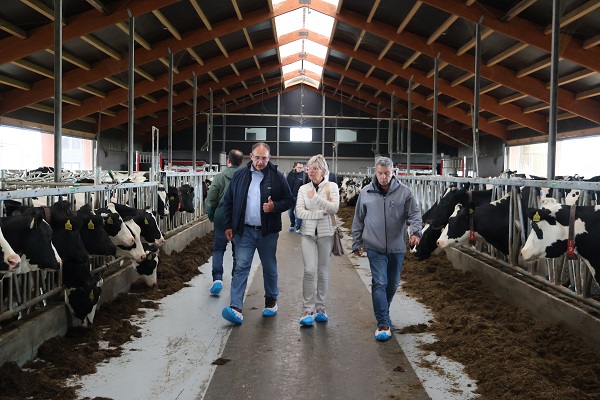 Farm in Schalkwijk, Netherlands;
Credit: MA
Farm in Schalkwijk, Netherlands;
Credit: MA
Luxembourg's Ministry of Agriculture, Food and Viticulture has reported that Minister Martine Hansen invited the Ammonia Task Task Force on a study mission recently.
The Ammonia Task Force was created following discussions at the "Landwirtschaftsdësch", with the mission of finding pragmatic and effective solutions to enable Luxembourg to achieve its ammonia emission reduction targets by 2030. Its role is also to support Luxembourg farmers in their transition to more sustainable practices.
In this context, Luxembourg's Minister of Agriculture, Food and Viticulture, Martine Hansen, invited the Task Force for a study trip to the Netherlands and Germany, from Monday 23 to Wednesday 25 September 2024. The objective of this mission was to examine the best practices and innovative technologies, already in use or in the testing phase in these two countries, to reduce ammonia emissions in agriculture.
During this visit, the Luxembourg delegation had the opportunity to discover several farms and innovation centres that are implementing innovative solutions. Among the topics discussed were the optimisation of animal feed, slurry management, the use of new technologies in stables and spreading techniques.
Minister Hansen stressed the importance of this trip: "For me, it is important to find solutions together. Other countries are facing the same challenges in reducing their ammonia emissions. That is why it is very interesting to see what is being done elsewhere." This approach is part of the national objectives aimed at reducing ammonia emissions by 22% by 2030.
The members of the Task Force, which includes representatives from the Agriculture Ministry, ASTA, SER, the Chamber of Agriculture, CONVIS and a representative from Luxinnovation, assessed the effectiveness of the different approaches. Among the most promising solutions, according to the ministry, was the optimisation of animal feed, as well as the management of livestock effluents in stables and on fields, which are proving to be major levers in reducing emissions. One of the challenges, however, will be the collection of data to monitor and measure the progress made.
The programme of this study trip included visits to farms and research centres such as the Praktijkcentrum de Marke in Hengelo, the Dairy Campus in Leeuwarden, and the Haus Riswick in Germany. These visits allowed the delegation to discover innovative techniques, such as slurry acidification and the "Lely Sphere" system, which contribute to making agricultural practices more sustainable.
The Ammonia Task Force members will now analyse the solutions observed during this trip in order to identify the most suitable approaches for Luxembourgish agriculture, with the aim of proposing relevant and economically viable technologies and methods that will enable Luxembourg to reduce its ammonia emissions in a sustainable manner, without jeopardising other environmental objectives.








